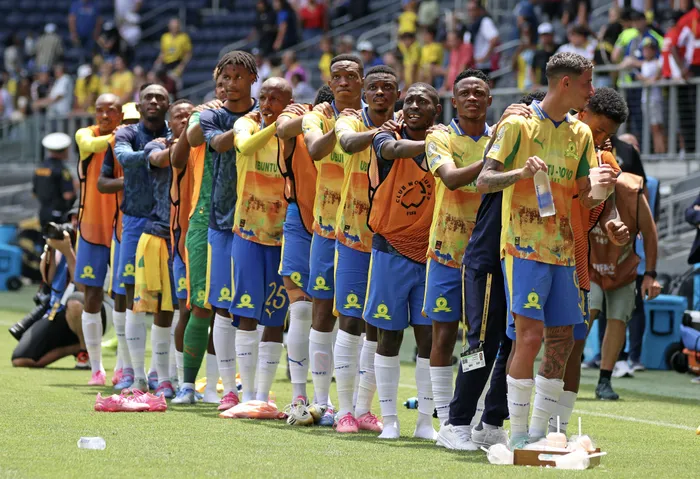From academy to world stage: the sports blueprint SA must follow
OPINION: Bringing in fresh blood – a sporting development lesson for our country

From academy prospects to young signings given time to develop, Sundowns have built a machine that refreshes itself year after year. That forward-thinking approach is the real reason they are now at the Club Wolrd Cup tournament.
Image: BackpagePix
When Mamelodi Sundowns step out onto the field against Brazil’s Fluminense on Wednesday night at 9 pm at the FIFA Club World Cup, in addition to carrying their own badge, they’ll also be bearing the flag for South African club football.
This is no small achievement – just their second appearance on this global stage – but what makes it truly remarkable is how they got here. Not through lucky draws or one-off cup runs, but through sustained excellence. And behind that excellence lies something even more important: a deliberate and ongoing investment in talent.
And this seems to be the recipe for South Africa’s sporting successes of late.
From academy prospects to young signings given time to develop, Sundowns have built a machine that refreshes itself year after year. That forward-thinking approach is the real reason they are now mixing it with the likes of the Copa Libertadores champions.
And they’re not alone.
Building the bench before the stadium
Sundowns’ rise mirrors a quiet, powerful truth emerging across South African sport: if you want to reach the top, you have to start at the bottom.
The Springboks are currently preparing to face the Barbarians in Cape Town – a so-called exhibition match that assistant coach Tony Brown says will be treated as seriously as a Test. The match may not carry official status, but the Springboks know it’s the start of something important: a 14-match season that will help shape the team going into the 2027 Rugby World Cup.
The mission? Evaluate, test, and develop depth. The current generation of double World Cup winners won’t be around forever, and the Boks know they must groom their successors now.
This is a calculated strategy; it’s not a mere gamble. A lot of thought and effort has been ploughed into this enterprise.
Sevens success, by design
You see the same long-term thinking in the success of the Springbok Sevens ‘A’ side. While the senior Blitzboks regrouped after a mixed season, the next wave of players was busy winning the Rugby Africa Sevens Cup in Mauritius. Get this … eight players in that team were uncapped at World Series level.
Coach Philip Snyman’s thinking was clear: give them minutes, give them pressure, and prepare them now for what’s coming next. “It does take a tournament or three before you’re ready for the World Series,” he said – and he’s right.
When a country wins world titles, it’s often because the work started long before the first whistle, the first kick-off, or even the first ball being bowled.
Proteas invest in the unknown
Yes, the same principle is at play with the Proteas Test squad now touring Zimbabwe. With five uncapped players in the squad, including young batting talent like Dewald Brevis and Lesego Senokwane, coach Shukri Conrad isn’t merely filling gaps in the team; he’s not just resting players, it’s more calculated than that, because he’s actually building for the future.
Of course, the players would love to win a series; after all, there’s national pride at stake. But on top of that, this is an opportunity to blood new players, experiment with combinations, and see who might be ready to face India, Pakistan or Sri Lanka in challenging conditions down the line.
What South Africa’s top sporting codes are showing, loudly and clearly, is that development is the engine of progress.
Lessons beyond the scoreboard
If there’s a lesson here for clubs, federations, and fans, it’s that sustainable success doesn’t come from short-term recruitment or one-off brilliance. Systems have to be put in place long before a crisis even arises. It’s vitally important to nurture young players long before they’re needed.
Obviously, Mamelodi Sundowns didn’t build a continental powerhouse overnight. They did it by giving youth a chance, by ensuring the next Themba Zwane or Cassius Mailula had a place to grow.
The same applies to the Springboks and their “new generation” testing the waters, or the Blitzboks introducing untested names in real match situations, or the Proteas touring just across the Limpopo river with the next chapter in mind.
Sporting greatness goes beyond the superstars who rake in the trophies and pile up the wins. True greatness comes from solid, dependable structures that allow those stars to emerge, develop, mature and eventually lead.
The national calling of sport
The cliche goes around about how sport unites our nation. So what happens when we take these success stories and these stories of bringing in fresh blood and think even bigger?
If sport can thrive through development, why not the country? Just as a club needs new blood, a nation needs fresh ideas, untapped energy, and space for young minds to grow. And just as Sundowns’ players will one day hang up their boots, so too will our leaders, teachers, and visionaries.
The sports field may look nothing like the halls of Parliament or the corridors of business or, dare I even say it, our classrooms around our country – but in these arenas, we win only when we prepare for what comes next.
We need to lay the groundwork now, so that when the next generation takes the field, they will not walk in cold, unprepared and overwhelmed. Our growth, our development and future success as a country depends on it!
Related Topics: